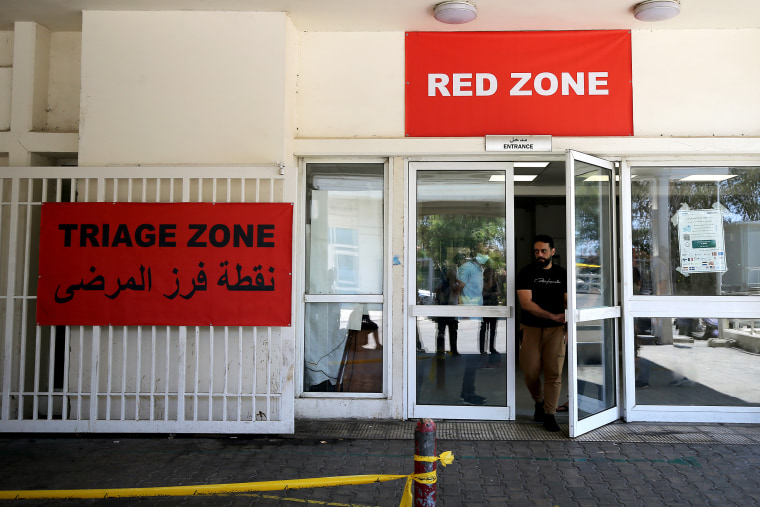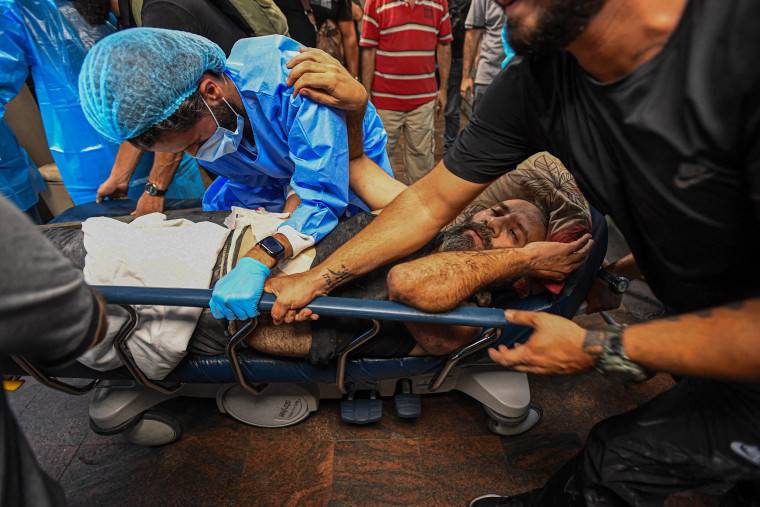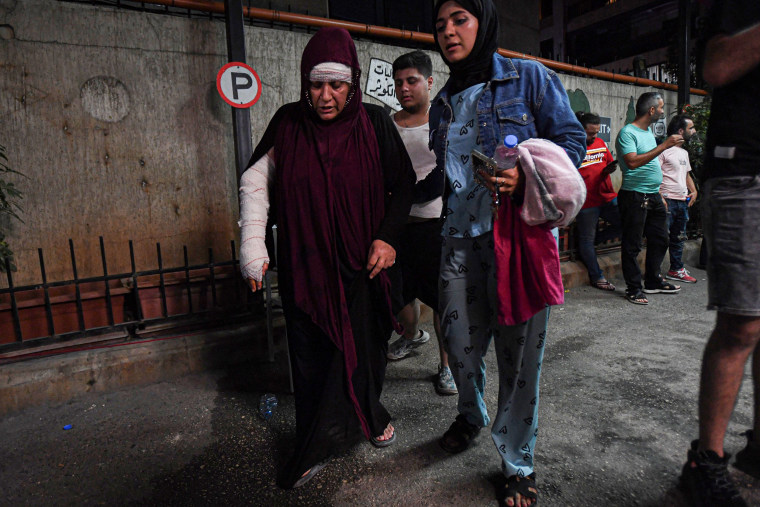BEIRUT — As Dr. Jihad Saadeh, the director of Rafiq Hariri University Hospital, the largest public hospital in Beirut, strolls through the facility, he rattles off the preparations staff have made for a much-anticipated full-scale war between Israel and Lebanon’s Hezbollah militant group.
He points to a new triage system that can whisk critical patients to high-level care “in seconds,” and a just-finished facility outside the entrance that can wash away weaponized poisons like white phosphorus. Fresh training, he says, will transform the dialysis clinic and other specialized areas into trauma surgeries in no time.
But is the hospital prepared for war — or a “mass casualty incident” in physician-speak? “Not very much. We are trying to prepare as much as possible,” Saadeh says, estimating that the hospital can withstand about 10 days of war before it will need outside supplies.

The threat of war has raised pressing questions about whether hospitals in Lebanon, which many assume will be on the front lines of such a conflict, can handle yet another crisis.
Saadeh diagnoses Lebanon’s health system as suffering from the same illnesses that afflict the country at-large: an economic crisis and soaring inflation; years of political deadlock and mistrust — particularly since a massive explosion rocked Beirut’s port in 2020; lingering symptoms from the pandemic; a crushing refugee burden; and the shadow of the last war with Israel two decades ago.
Both Iran and Hezbollah have vowed to avenge the twin assassinations last month of senior Hezbollah and Hamas figures. Both blame Israel, which has claimed responsibility only for killing Hezbollah commander Fouad Shukur.
The assassinations happened against the backdrop of the war between Israel and Hamas in Gaza, which started after Hamas attacked Israel on Oct. 7, killing 1,200 people and taking more than 240 hostage. About 40,000 Palestinians have died in Gaza since Israel launched its retaliatory military operation, according to health officials in the enclave.
At the same time, 10 months of low-level war between Israel and Hezbollah, the Iran-backed militant group based in Lebanon’s south, have brought the broader Middle East to the brink of war.
“On top of the general background of a country that is burdened by a historic economic collapse, the health sector — in particular, hospitals, clinics, trauma centers — is not well prepared for the kind of war that is knocking on Lebanon’s door,” says Firas Maksad, a Lebanese politics expert at the Washington-based Middle East Institute.
The World Health Organization last week delivered almost 32 tons of medical supplies, including trauma kits, to the country. Its acting representative in Lebanon, Dr. Abdinasir Abubakar, told NBC News that “on a certain level, yes, the health care system is prepared to deal if there is a major crisis. But the question is, how long?”
His concerns echo those of Lebanon’s government, which is worried that hospitals and doctors could become targets, as they have in Gaza. But when it comes to handling crises, Lebanon’s doctors say they have something many others don’t: experience.
“We have a resilient health sector,” says Firas Abiad, Lebanon’s minister of health. “But unfortunately, we don’t know the magnitude of events that [could] unfold.”

When the Lebanese now contemplate war with Israel, they invariably look back to the monthlong conflict in 2006 that resulted in nearly 2,000 deaths and about 11,000 casualties, according to ministry numbers. The health care sector learned quite a bit from that war.
Saadeh has prepared his hospital’s security and triage system, for example, to deal with victims’ family members flooding the hospital and interrupting care during the fighting. And this time, hospitals have had the benefit of months of preparation as they collect enough medicine, plasma and other goods to maintain nationwide medical stockpiles for months of war, Abiad said.
“In 2006, one of the first places that were targeted were our ports, either airports or seaports,” he says. “It was a de facto blockade.”
Despite those logistical challenges, the WHO’s Abubakar said that in terms of resources and capacity, the country’s government was able to support its health care system.
Even so, Lebanon has become much more dysfunctional since then. Even before 2019, some 80% of the population had come to rely on private health care, leaving the public health care system unaccustomed to mass coverage. Then the financial crisis hit, inflation soared and gaps opened up in the supply of pharmaceuticals and just about everything else.
“Now do we have a government who can support the health system?” Abubakar said. “No, we don’t.”
Recent high-level talks between health ministers and pharmaceutical distributors were productive, said Sleiman Haroun, the president of Lebanon’s Syndicate of Hospitals. Haroun added that distributors told ministers they have enough medicine and supplies for five months, while officials assured hospitals they will free up cash to help with preparation efforts.
But there are two crucial commodities that can’t be bought or stored: oxygen and electricity. “These are two main concerns that we cannot really deal with and we cannot really solve,” said Haroun, who described a lack of either resource as potentially “fatal.”
Lebanon has just one oxygen-bottling plant, while the country’s beleaguered electrical network now provides only a few hours of electricity per day. That leaves most of the country — including hospitals — reliant on fuel-run generators.
During a recent two-hour visit to Saadeh’s Rafiq Hariri University Hospital, flickering lights meant the whole hospital was plunged into darkness for 10-second intervals.

Even if the health system is able to resolve those problems, no sector is safe from the brain drain that has hammered Lebanon’s workforce. A staggering 30% of highly qualified and well-reputed medical professionals have left Lebanon in recent years, health minister Abiad said. Last year, the Lebanese Order of Physicians put that exodus at 3,000 doctors and 5,000 nurses.
That said, Abiad points to the recent resilience of Lebanon’s hospitals under pressure. During the pandemic, he says, “we never reached a stage where our hospitals were overrun or we didn’t have any respirators.”
And when the ammonium nitrate explosion devastated Beirut’s port — it was one of the largest nonnuclear explosions in history — and tore through the capital’s downtown, the country’s hospitals handled 6,000 casualties in a 12-hour period.
Resilient or not, though, Lebanon’s medical professionals are less anxious about a repeat of 2006 than they are about reports from Gaza, where Israel has laid siege to multiple hospitals it accuses of sheltering militants.
“They targeted hospitals, they destroyed hospitals. This is something unthinkable,” Haroun said. “If they do this in Lebanon, we’re in deep trouble.”






